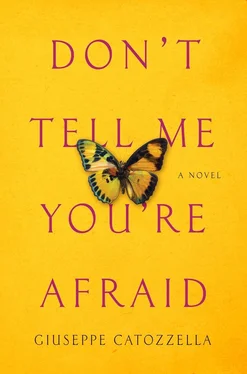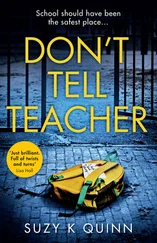She would do all these things with him.
I would have to settle for mornings.
Every day, in fact, Hodan and I continued to see each other to go to school. We met halfway between her new home and ours, which were barely half a kilometer apart, and we walked the last stretch together.
She described what it was like to be a wife at sixteen and live in the home of people who loved you but who, in the end, were strangers. She told me that you had no choice but to grow up. It made me think that I certainly didn’t want to get married; each day I was more and more convinced that the only things I really wanted to be wed to were a tartan track with no holes and a good pair of running shoes with cleats. Every morning when we met, Hodan hugged me, kissed the top of my head, and told me she missed me. I admitted that since she’d gone I occasionally had bad dreams. Then she asked about everyone, about Aabe and Hooyo, about our brothers and sisters; she wanted to be filled in on every detail, even though she and Hussein came to our house for supper at least once a week.
She needed to know everything, as if we were light-years away. Her eyes flashed with impatience and nostalgia until I described every single minute of our new home life.
The school we went to wasn’t large or even attractive: The walls were peeling and the desks were worn; still, it was a school, and I liked it there. I enjoyed the classes, especially gym, where I was the best, but also arithmetic and accounting. My favorite thing of all, though, was the geometry theorems. It was amazing to learn that there were laws hidden in the world around us: in the rectangles of courtyards or in outhouse pits. Or, for example, in the circle that the burgico left on the ground after cooking. It seemed magical, and it gave me a sense of assurance. If there were rules that explained it, the universe couldn’t be so bad. Maybe someday we would come to discover the laws that led men to wage war, and when that day came we would eliminate it forever. It would be the greatest day in the history of mankind.
But the best part of school took place during recess. Hodan and I had always eaten rice and vegetables, which were never lacking, especially once Hooyo had started working. But now, since Hodan lived in a household that was more prosperous than ours, she would sometimes bring meat. Hussein, like his father, was an electrician, and in a country at war, given everything that ends up ruined or destroyed each day, there’s never any lack of work for an electrician.
I ate in five minutes and spent the rest of the time playing. Hide and seek, for instance. There weren’t many places to hide, so you had to use your wits. Sometimes I sat down on the ground with a group of girls who were eating or talking in the yard, hoping to go unnoticed. Or I’d duck behind the trunk of an acacia. Or behind the big trash bin. Or behind the teachers, who laughed when we crouched under their garbasar, shawls. Anyway, even when they discovered me, I was always the fastest to reach the back wall of the courtyard.
In the afternoon Hodan and I returned home knowing that we had spent the day usefully. Aabe always told us: “ Mangiate la zuppa finché è calda . Eat the soup while it’s hot!” Another one of his Italian proverbs. Try to take pleasure in school. Think of it as a privilege, not as something boring. Enjoy it while the money lasts, because with the war we live from day to day.
When it was time for Hodan and me to part, at the corner of avenue Jamaral Daud, there were tears. Hers and mine, every day.
It didn’t matter that we would see each other the next morning: We didn’t want to be separated. In fact, we made up a thousand excuses to stay together.
Once in a while I went to hear her sing with the Shamsudiin Band. There were about a dozen musicians who met three afternoons a week in a large concert hall, or what was left of it, in the area of the old port, near the sea.
To get there you had to turn onto a street from which, for a stretch, you could see the shore on the horizon between the houses.
Sometimes we did everything we could not to look in that direction. But there were days when it was too painful, days when the sun shone brightly in a blue sky and a fresh wind blew in from offshore. It was especially hard for Hodan, who had gone swimming and played in the sand as a child, and remembered how exquisite it was.
On those days, if we were happy or carefree, one of us would simply say: “Should we look at it?”
The other always answered yes. Then we would duck into a space between the houses so we wouldn’t risk bumping into some militiamen, and we’d stay there gazing at the sea for an hour. We never even thought about venturing out onto the sand, as I used to do with Alì when I was little.
We squatted there in a narrow gap between two houses, staring at the horizon, and didn’t breathe a word, our garbasar trailing in the fine white dust.
The sun’s play on the waves made our thoughts soar. There was no need for words. At those moments everything was exactly as it should be; we didn’t ask for anything more, for anything to change. Just to be together forever like that.
Going to hear Hodan sing was fabulous. Behind the platform where the group played hung a well-known Somali proverb — or maybe it was well known only to me, because Hodan was always repeating it to me: Durbaab garabkaga ha kugu jiro ama gacalgaaga ha kuu rumo, which means “Let the music play; all we need is music.” It was her motto and her reason for being.
Hodan sat on a chair in the center of the group, marking the rhythm by tapping her fingers, palms joined; every so often she clapped her palms in a sacab, a stronger beat that served to mark a pause for the other members. Behind her were the players of the shareero, a kind of lyre, and the kaban, a lute, then all the others with drums and the shambal, two pieces of wood with a hole in the middle; beside her was someone who played the gobeys, a somewhat strange flute. There was also someone playing the koor, the bell that a camel wears around its neck; at first this made me laugh, because it seemed like such a simple instrument that even a camel could play it — there was no need for a man.
When she was able to sing her songs, Hodan was transformed.
Her face relaxed. As soon as she started a tune, she let the music of her own voice carry her away, closing her eyes and smiling with an ecstatic expression.
When I told her that on the way home, she got embarrassed. “You look like you’re in ecstasy when you sing. Like you’re having an orgasm,” I said, just to make her blush.
“Don’t be silly. You don’t even know what you’re talking about,” she replied, turning her face away because she knew she’d turned red.
“Of course I do. Alì tells me all about what it’s like to have sex! His friend Nurud says he already did it once and that women make funny faces when they’re in ecstasy, as if they were praying to Allah and Allah suddenly answered their prayer.”
“Well, tell Alì that his friend doesn’t know anything about it.”
“They’re the same faces you make when you sing!”
“I don’t make faces when I sing!” Hodan got angry and said that from then on she would sing with her back to the audience or with a paper bag over her head.
The rehearsals usually went on for two or three hours, and after a while I got bored. At that point I’d go to the back of the room and do some stretches, since at that time Alì was insisting that I develop the muscles of my legs, which to me, skinny as I was, always seemed to be stretched to the breaking point.

Читать дальше





![Ally Carter - [Gallagher Girls 01] I'd Tell You I Love You But Then I'd Have to Kill You](/books/262179/ally-carter-gallagher-girls-01-i-d-tell-you-i-lo-thumb.webp)







